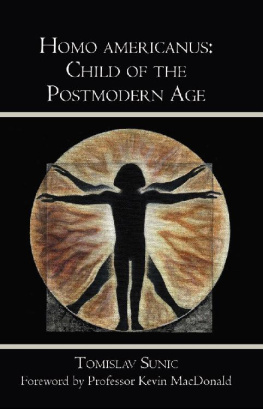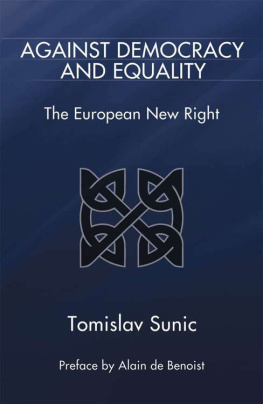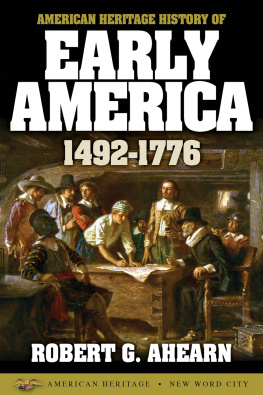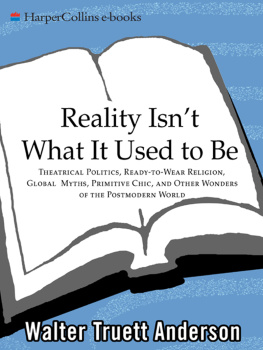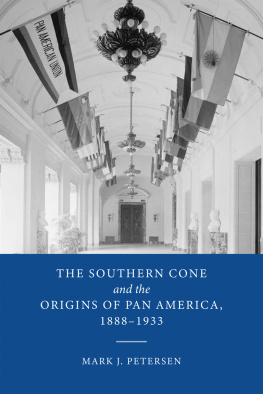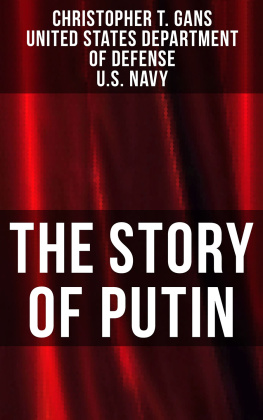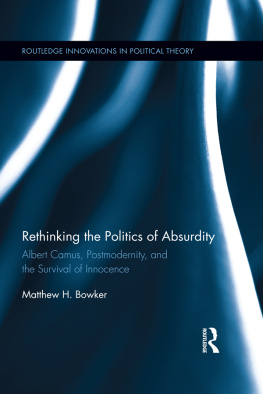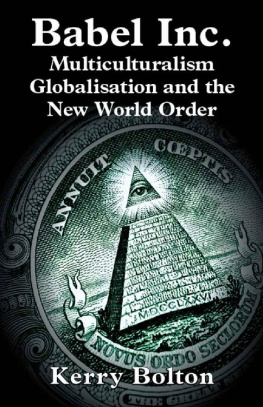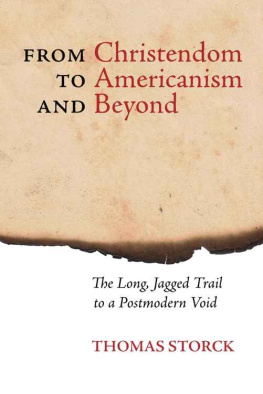Homo americanus:
Child of the
Postmodern Age
Homo americanus:
Child of the
Postmodern Age
Tomislav Sunic
Foreword by Professor Kevin MacDonald
Copyright 2007 Tomislav Sunic
All rights reserved.
ISBN: 1-4196-5984-7
ISBN-13: 978-1419659843
Visit www.booksurge.com to order additional copies.
Cover Art: Man Sun by Harold Arthur McNeil
Artist Website: www.thirdcamelot.com
Homo americanus:
Child of the
Postmodern Age
Table of Contents
Preface
A preface to a book may serve as the authors place for justifying his scriptural shortcomings. In some cases it tacitly serves as a place for his ethical and ideological disclaimers. Also, when uncertain of the general direction of his main thesis, the author may resort to excuses in his preface, as if wishing to forestall the reader from passing harsh judgments against him, and also nudge him into showing more comprehension and compassion for his often mediocre prose. Some readers, right at the start of this book, may accuse me of similar shortcomings, that is, of presenting my subject matter clumsily or differently from what they expected. I am aware that the subject discussed in the book is very large. Every subtitle in this book could generate several volumes of deeper analyses and each minor bibliographic note at the end of the book could expand into a load of books able to fill an entire library shelf.
However much the vast topic of America and Americanism has the advantage of offering an author methodological and ideological latitudes, it also has its limits. The fluid and much abused word Americanism contains an impressive inventory of concepts, each consisting of dozens of distinctive elements and each requiring its own mode of analysis. I conceived of this book as a short summary of ideas by authors critical of Americanism and its two main facets: belief in progress and egalitarianism.
The reader will notice that I mainly use a descriptive style, translating and quoting European and American authors who write from their own perspectives and within their own fields of study about various aspects of Homo americanus, without necessarily ascribing value judgments to my own paragraphs. Toward the end of the book, however, I use a more analytical approach, which to some extent, may be viewed by the reader as colored by my own biased assessments. Having lived in Europe and America, having experienced lengthy spans and spasms of life in communism and capitalism, I am trying to project myself into two diverse geopolitical and socio-historical perspectivesboth as a critic of Americanism from within and as a critic of Americanism from without; both as a subject of criticism and as the object of criticism. I am trying, however, to avoid the anti-American clichs that still appear among many cultivated European authors and which are often founded on sketchy, vicarious, second-hand hearsay knowledge of America. In fact, I am also arguing that Americanism, with a different system of values, different people in charge of cultural hegemony, and of course, under a different historical setting, could have become a true motivating force of creativity for a large number of people of European extraction.
This book contains quotations and descriptions by authors who are savants in the fields of sociobiology, philosophy, history and literature. The reason I am using an interdisciplinary approach to such a vast topic lies in the fact that I have always avoided a single approach in the humanities. The manner in which the social sciences has been taught in Europe and America since 1945, both in terms of methods and content, has been heavily determined by the referents of antifascism and democracy. Authors, even when mildly critical of liberalism, parliamentary democracy, or multiculturalism, have had marginal readership, which does not exclude the likelihood of the same fate for the present book and its author.
In understanding the spirit of Americanism, be its good or bad side, it is my view that American novelists or essayists like Sinclair Lewis, Henry Miller, Edgar Allan Poe, or H.L. Mencken, let alone French novelists, L. F. Cline, Henry de Montherlant, Jean Cau, or the German Joachim Fernau, to name only a few, can better bring us the stench or beauty of Americanism than hundreds of sociologists, political scientists, eugenicists, and other experts dealing with the subject matter of Americanism within their own narrow field of specialization. Of course, one could study Homo americanus, that is the proverbial American man, from the sociobiological perspective; or for that matter one might describe the American life style from the point of a view of a clinical psychologist or a criminologist. One could also use the field of religious studies in examining American foreign policy. All these approaches are valid, but when taken separately and when disconnected from each other, they lead to a boring area study and they also show signs of academic reductionism. It is the intent of this book to reject a one way specialized approach in studying Americanism and try to encompass instead as many other approaches in social science as possible. For that matter, I hope the book will be a good introduction for the future study of Americanism. I have made an effort to describe American man as observed by a cultivated European, but I also examine the self-perception of American citizens.
When a reader opens up a book dealing with a social phenomenon, it is commendable that he looks first into the authors ethnic, social, racial, and historical pedigree. Do not we all have prejudices, even if we do not wish to admit to the fact? And are not our views, however sophisticated and learned they may be, also colored by our racial origin, our family tree, and our early upbringing? This is in particular true when studying contemporary history which this book also uses as a framework for analyzing Homo americanus.
A cautionary word needs to be added. The English historian Edward Carr, once wrote that before studying history a student or a reader must first study the historian. This same principle of positive or negative empathy with any author must be applied in any field of social science. Therefore, a reader of this book is justified to raise the question regarding my motives in writing this book. Also, he should ask me a standard question as to who is this book designed for? Hence the eternal: Cui bono?
A reader will note that a large number of authors quoted in this book had or still have a reputation of being on the right side of political spectrum, and are often dubbed in the liberal and socialist vernacular as right-wingers, nationalists, or racists. Being a user but also a victim of the English language and its meta-language, as it is in standard use by the late 20th and early 21st century, this may also apply to the choice of my own words in the present text. Many words used in this book, such as traditionalists, racialists, right-wingers, although having politically negative connotation, once upon a time had a neutral or positive connotation. For instance, the word democracy, acquired by the late 20th century a sacrosanct meaning; it is viewed as a crowning glory for normative political discourse. However, it cannot be ruled out that a hundred years from now, this word will acquire a pejorative meaning and might be avoided like the plague by future opinion makers or the future ruling class in America. I must admit that in my quotations I largely resort to anti-liberal and so-called right-wing authors whose critical vision of Americanism has been ostracized or has not received a due hearing. In my chapter on postmodernity and the English language, I examine in more detail the semantic distortions that many English American words were subjected to in the course of the 20th century.
Next page
